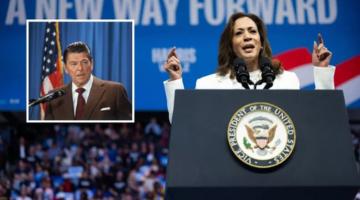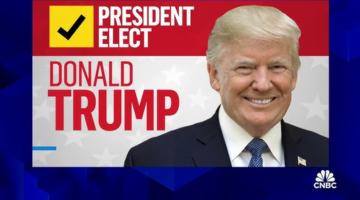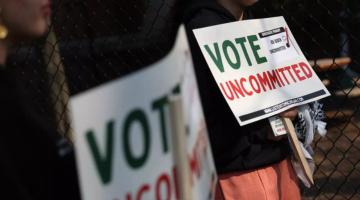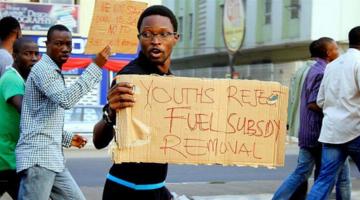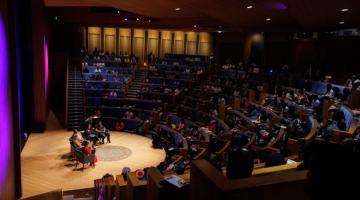Attendees hold up signs during a campaign rally with Democratic presidential nominee and US Vice President Kamala Harris at Craig Ranch Amphitheater, Las Vegas, Nevada, on 31 October 2024 (Ethan Miller/Getty Images/AFP)
The fate of billions whom the US dominates and oppresses is effectively exchanged for a few possible reforms in domestic policies that affect parts of middle-class America.
Originally published in Middle East Eye .
One of the key responsibilities that critical American intellectuals have always shirked is considering the far-reaching effects of voting in the United States .
There is presently no other country whose elected officials' policies and stances have as great an impact on the rest of the globe. It is an advantage that the US has held since at least 1990 as a formidable force controlling most of the world.
Yet its hegemonic position and militarism seem immaterial to those Americans who feign a sense of cosmopolitanism or, more importantly, worldliness.
Talk of the "global village" does not usually recognise that this village is dominated by the US and its superpower stature.
The global apartheid system in which we live is one wherein only Americans are eligible to vote for the power that controls the rest of the world.
Although few of these "worldly" intellectuals and academics who participate in the electoral process would deny this fact, they invariably limit their concerns to the impact of their votes on the US alone.
Parochialism For decades, I asked such intellectuals and academics with pretensions of worldliness how they could only consider the Democratic or Republican Party's policies on domestic matters, which affect some 345 million Americans, versus global matters that affect eight billion people.
The answer consistently boils down to the fact that both parties pursue imperialist policies around the world. Since the only variation in their programmes relates to domestic issues, it becomes necessary to vote for the "lesser evil " and defend it as an absolute good to defeat the more evil.
Such logic renders the billions of people around the world whom the US dominates and oppresses, directly or indirectly, as insignificant or at least utterly irrelevant to these American intellectuals' political calculus.
The fate of these billions is effectively exchanged for a few possible reforms in domestic policies that would affect parts of middle-class and wealthy America - the main beneficiaries of American imperialism and oppression of the rest of the globe.
This means that the alleged worldliness and cosmopolitanism of many of these intellectuals and academics - and their dissimulation that they are "citizens of the world" about whose climate crisis they began to express much concern in the last two decades - evaporate every time they vote in national elections. It is then that their parochialism and "America first" attitude are shamelessly on full display.
Anti-colonial resistance Dissident American anti-imperialist intellectual Noam Chomsky once dismissed the notion that people in the US-dominated part of the world could ever defeat the US empire and its European colonial lieutenants.
He argued instead that successful opposition to imperial policies can only come from Americans and Western Europeans: "There are few realistic options , in the world as it exists, unless the population of the major powers reaches a level of civilisation transcending anything we now see and restrains the violence of the states that dominate the international system."
He added with much alacrity: "As for the Third World liberation movements of the sixties, I never thought that they were likely to provide any useful lessons for Western socialists."
Although Chomsky declared this position in the late 1980s, he was intervening in an important debate that dates back at least to the first decade of the 20th century.
The importance of the self-determination of colonised peoples and whether their resistance against colonialism and imperialism was the primary struggle that would help defeat the colonial empires was the central issue at stake.
This part of the debate on the colonial question took place in the early 1920s within the Communist International.
The main issues centred on the question of "labour aristocracy" in the imperialist and colonialist countries, which, as the Indian communist Manabendra N Roy argued, would never be allies of workers and peasants in the colonised countries. Imperial powers had bribed their own working classes with the profits made in the colonies.
VIDEO
During this same period, the newly established Soviet state banked on socialist revolutions overtaking European colonising countries, after which they would presumably help liberate the colonised world. (The Soviets would go on to revise their position in 1921 after the defeat of the European revolutions and the eruption of anti-colonial uprisings across the colonised world.)
Roy, however, argued that the liberation of the colonised world was, in fact, the necessary pre-condition for the liberation of the colonising world - a view he shared with Soviet leader Vladimir Ilyich Lenin, though the latter did not articulate it as a pre-condition.
Liberal pretension Frantz Fanon, the prominent anti-colonial thinker, also held this position on the struggle for liberation.
He understood by the early 1960s that only the colonised would be able to defeat the ongoing imperial depredations visited on the globe, especially given the complicity of the white liberals and socialists of the colonising countries.
Fanon recognised that these groups, like the white labour aristocracy, were also direct beneficiaries of the imperialist system: "Leave this Europe where they are never done talking of Man, yet murder men everywhere they find them, at the corner of every one of their own streets, in all the corners of the globe."
Fanon added that "some Europeans were found to urge the European workers to shatter this narcissism and to break with this un-reality. But in general, the workers of Europe have not replied to these calls, for the workers believe, too, that they are part of the prodigious adventure of the European spirit".
I cite this history to show that many communists in the 1920s, like most white liberals and socialists then and now, harboured such Eurocentrism.
They were always ready to sacrifice the welfare of the rest of the world for the sake of European revolution in the case of the communists, or domestic reform in the case of US liberals, or even anarchists like Chomsky.
How else can one explain the persistent collaboration of western liberal and leftist intellectuals with the imperial system and their neglect of - if not outright contempt for - the rest of the globe?
Why is it that what supposedly moves them today are questions on the climate and not genocide, starvation, poverty, or imperial wars of aggression?
The answer is simple: the impact of the climate crisis, which we have inherited as a direct result of US and European actions and policies, is now also felt in the US and Western Europe, the two regions that are the central and principal concern of liberal and leftist American and European academics and intellectuals.
Their subterfuge that caring for the climate makes them "citizens of the world" is no more than the most recent pretension that these intellectuals and academics have to worldliness when it is yet another proof of their parochialism.
One would think that the racial and national privileges that American voters enjoy while deciding the fate of the entire global population would weigh heavily on those who consider themselves anti-nationalist, anti-imperialist, or simply "global citizens".
Far from it!
What unites leftist and liberal voters with right-wing voters in the US in this year's elections is the same thing that has always united them: America first, and après nous le déluge!
Joseph Massad is professor of modern Arab politics and intellectual history at Columbia University, New York. He is the author of many books and academic and journalistic articles. His books include Colonial Effects: The Making of National Identity in Jordan; Desiring Arabs; The Persistence of the Palestinian Question: Essays on Zionism and the Palestinians, and most recently Islam in Liberalism. His books and articles have been translated into a dozen languages.



